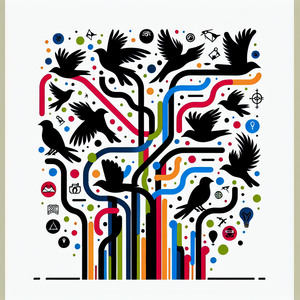The Rise of the Hybrid Inspector: How AI and Technology are Reshaping Aviation Safety

For decades, aviation safety inspectors have relied on their experience, intuition, and meticulous attention to detail to uphold safety standards. They conducted manual inspections of aircraft, pored over maintenance logs, and evaluated compliance with Federal Aviation Administration (FAA) regulations and international standards. This human-centric approach has worked remarkably well, contributing to aviation’s reputation as one of the safest modes of transport. However, the landscape of aviation has changed dramatically in recent years. Modern aircraft now generate massive amounts of data from sensors, flight logs, and maintenance records. The sheer volume and complexity of this data make it increasingly difficult for humans alone to process and analyze effectively. Traditional methods of inspection, while still valuable, are no longer sufficient to address the intricacies of today’s aviation systems. Enter AI and advanced technology. Predictive analytics, real-time data monitoring, and machine learning algorithms have introduced a new paradigm for aviation safety. Inspectors are no longer solely reliant on physical inspections; they now have access to powerful tools that enable them to identify risks, anticipate failures, and make proactive decisions. This shift is not about replacing human inspectors but augmenting their capabilities with insights that only machines can provide.
The Role of AI in Inspection
AI has become a game-changer in aviation safety inspection, offering capabilities far beyond routine monitoring or automated checklists. Here’s how AI is redefining the inspection process: 1. Predictive Maintenance: AI algorithms analyze historical data and sensor readings to predict when components are likely to fail. This predictive capability allows inspectors to recommend maintenance activities before issues become critical, minimizing the risk of in-flight failures and costly delays. Example: Rolls-Royce’s Engine Health Monitoring system uses AI to predict engine wear and tear, enabling airlines to plan maintenance more efficiently. 2. Real-Time Data Analysis: Aircraft systems generate terabytes of data during each flight, ranging from engine performance metrics to atmospheric conditions. AI tools process this data in real time, flagging anomalies that might indicate potential safety risks. Example: An AI system might detect unusual vibrations in an engine mid-flight, prompting an immediate inspection upon landing. 3. Risk Prioritization: AI-driven analytics assess historical patterns and current conditions to prioritize areas of potential risk. This helps inspectors allocate their time and resources more effectively, focusing on the most critical issues. Example: An analysis of maintenance records might reveal recurring issues with a specific aircraft model, prompting heightened scrutiny during inspections. By enhancing inspectors’ ability to identify and address risks proactively, AI significantly boosts the efficiency and effectiveness of safety oversight.
Blending Human Expertise with Machine Insights
While AI offers powerful tools for aviation safety, it cannot replace the nuanced judgment and contextual understanding that human inspectors bring to the table. Machines excel at processing large datasets and identifying patterns, but they lack the ability to interpret these findings in the context of real-world scenarios. For instance, an AI system might flag a sensor reading as abnormal, but it takes a trained inspector to determine whether this is due to a genuine issue, a sensor calibration error, or an unusual yet harmless operational condition. The hybrid inspector, therefore, is an individual equipped to bridge this gap—leveraging AI-generated insights while applying human expertise to make informed decisions. To thrive in this role, hybrid inspectors must develop a unique skill set that includes: - Data Literacy: The ability to interpret and act on AI-generated reports and analytics. - Technical Proficiency: Familiarity with modern aircraft systems and the software tools used for data analysis. - Critical Thinking: The capacity to evaluate machine-driven recommendations and apply judgment based on experience and situational awareness. Recognizing this need, training programs for aviation safety inspectors are evolving to include courses on data science, machine learning, and digital tools alongside traditional inspection techniques.
Challenges and Concerns
The rise of the hybrid inspector offers numerous benefits, but it also brings challenges that must be addressed to ensure the success of this transformation. 1. Over-Reliance on Technology: One significant concern is the risk of inspectors becoming overly dependent on AI systems. While technology can identify risks, it is not infallible. Blindly trusting machine-generated insights without questioning their validity could lead to critical oversights. To mitigate this, the industry must emphasize the importance of maintaining a balance between human judgment and technological assistance. 2. Continuous Training: As technology continues to evolve, inspectors must stay up-to-date with the latest tools and techniques. This requires a commitment to continuous learning from both individuals and organizations. The aviation industry must invest in ongoing education and provide resources for inspectors to develop their skills. 3. Integration Challenges: The seamless integration of AI tools into existing inspection workflows can be complex, requiring collaboration between technology providers, airlines, and regulatory authorities.
The Future of Aviation Safety
The rise of the hybrid inspector is just the beginning of a broader transformation in aviation safety. As AI and machine learning technologies continue to advance, we can expect even more sophisticated tools to emerge. Potential innovations include autonomous inspection drones, augmented reality (AR) systems for real-time visualization of aircraft components, and blockchain-based maintenance records to enhance transparency and traceability. However, no matter how advanced technology becomes, the human element will remain indispensable. Aviation is fundamentally a people-centered industry, and the safety of passengers and crew depends on the expertise, judgment, and dedication of professionals who prioritize safety above all else.
The aviation industry is at the cusp of a new era in safety inspection, with the rise of the hybrid inspector leading the charge. By blending human expertise with the power of AI and advanced technology, these professionals are redefining what it means to ensure safety in an increasingly complex and data-driven world. While the transition presents challenges, it also offers immense opportunities to enhance safety, efficiency, and reliability across the aviation sector. As we look to the future, one thing is clear: the hybrid inspector is not a passing trend but a necessity for an industry that must continually adapt to new challenges and innovations. By embracing this evolution while maintaining a strong commitment to human judgment and ethical oversight, the aviation industry can continue to set the gold standard for safety in the skies.
AI-Powered Aviation Safety Specialist
Boeing, Airbus, GE Aviation, Honeywell Aerospace
Job Description
Develop and implement AI-driven tools for predictive maintenance and real-time data analysis in aircraft systems.
Collaborate with engineers and data scientists to interpret machine learning reports and identify potential safety risks.
Provide actionable insights to maintenance teams based on AI-flagged anomalies and trends.
Required Skills
Strong background in data science, aviation engineering, and FAA compliance.
Expertise in tools like Python, TensorFlow, or similar AI frameworks.
Hybrid Aircraft Inspector (Human + AI Expertise)
Delta Air Lines, United Airlines, FAA, Rolls-Royce
Job Description
Conduct physical inspections of aircraft while leveraging AI-generated analytics to identify high-risk areas.
Evaluate AI-driven insights in the context of real-world scenarios to make informed safety decisions.
Ensure compliance with aviation safety regulations such as FAA standards and international guidelines.
Required Skills
Deep understanding of aviation systems.
Proficiency in AI tools.
Certifications like FAA Inspection Authorization (IA) or equivalent.
Drone Operations and Safety Analyst
DJI, Amazon Prime Air, NASA, FAA
Job Description
Oversee the integration of drones into controlled airspace, ensuring compliance with safety protocols and air traffic regulations.
Use AI and machine learning to monitor drone flight data and predict potential risks or failures.
Develop risk mitigation strategies and collaborate with regulatory authorities to maintain safety standards.
Required Skills
Knowledge of unmanned aerial systems (UAS), air traffic management, and AI-powered telemetry systems.
Predictive Maintenance Engineer (Aviation Focus)
Pratt & Whitney, Lufthansa Technik, Safran, Bombardier
Job Description
Design and manage predictive maintenance programs using AI to analyze aircraft sensor data and historical maintenance logs.
Collaborate with airlines and manufacturers to prevent mechanical failures through data-driven insights.
Implement machine learning algorithms to forecast component wear and schedule proactive repairs.
Required Skills
Expertise in predictive analytics, engineering systems, and software like MATLAB or R.
Experience with aircraft maintenance operations.
Aviation Data Systems Architect
Lockheed Martin, Raytheon Technologies, FAA, Embraer
Job Description
Develop and maintain complex data systems to support AI-driven aviation safety initiatives.
Integrate real-time data streams from aircraft sensors into centralized platforms for analysis.
Ensure data security and compliance with aviation industry standards while optimizing systems for scalability.
Required Skills
Advanced knowledge of data architecture, cloud computing (AWS, Azure), and regulatory frameworks like DO-178C.


